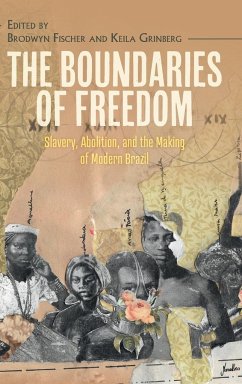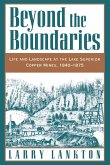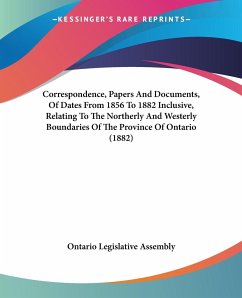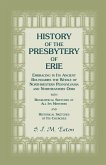The Boundaries of Freedom
Herausgeber: Fischer, Brodwyn; Grinberg, Keila
The Boundaries of Freedom
Herausgeber: Fischer, Brodwyn; Grinberg, Keila
- Gebundenes Buch
Andere Kunden interessierten sich auch für
![Faith and Boundaries Faith and Boundaries]() David J. SilvermanFaith and Boundaries27,99 €
David J. SilvermanFaith and Boundaries27,99 €![Slavery and Freedom in Black Thought in the Early Spanish Atlantic Slavery and Freedom in Black Thought in the Early Spanish Atlantic]() Chloe L. IretonSlavery and Freedom in Black Thought in the Early Spanish Atlantic113,99 €
Chloe L. IretonSlavery and Freedom in Black Thought in the Early Spanish Atlantic113,99 €![Beyond the Boundaries Beyond the Boundaries]() Larry D. LanktonBeyond the Boundaries64,99 €
Larry D. LanktonBeyond the Boundaries64,99 €![Correspondence, Papers And Documents, Of Dates From 1856 To 1882 Inclusive, Relating To The Northerly And Westerly Boundaries Of The Province Of Ontario (1882) Correspondence, Papers And Documents, Of Dates From 1856 To 1882 Inclusive, Relating To The Northerly And Westerly Boundaries Of The Province Of Ontario (1882)]() Ontario Legislative AssemblyCorrespondence, Papers And Documents, Of Dates From 1856 To 1882 Inclusive, Relating To The Northerly And Westerly Boundaries Of The Province Of Ontario (1882)47,99 €
Ontario Legislative AssemblyCorrespondence, Papers And Documents, Of Dates From 1856 To 1882 Inclusive, Relating To The Northerly And Westerly Boundaries Of The Province Of Ontario (1882)47,99 €![State and National Boundaries of the United States State and National Boundaries of the United States]() Gary Alden SmithState and National Boundaries of the United States62,99 €
Gary Alden SmithState and National Boundaries of the United States62,99 €![An Investigation Of The Unsettled Boundaries Of Ontario (1873) An Investigation Of The Unsettled Boundaries Of Ontario (1873)]() Charles LindseyAn Investigation Of The Unsettled Boundaries Of Ontario (1873)32,99 €
Charles LindseyAn Investigation Of The Unsettled Boundaries Of Ontario (1873)32,99 €![History of the Presbytery of Erie, Embracing in Its Ancient Boundaries the Whole of Northwestern Pennsylvania and Northeastern Ohio History of the Presbytery of Erie, Embracing in Its Ancient Boundaries the Whole of Northwestern Pennsylvania and Northeastern Ohio]() S. J. M. EatonHistory of the Presbytery of Erie, Embracing in Its Ancient Boundaries the Whole of Northwestern Pennsylvania and Northeastern Ohio45,99 €
S. J. M. EatonHistory of the Presbytery of Erie, Embracing in Its Ancient Boundaries the Whole of Northwestern Pennsylvania and Northeastern Ohio45,99 €-
-
-
Produktdetails
- Verlag: Cambridge University Press
- Seitenzahl: 504
- Erscheinungstermin: 1. März 2022
- Englisch
- Abmessung: 235mm x 157mm x 34mm
- Gewicht: 961g
- ISBN-13: 9781108831536
- ISBN-10: 1108831532
- Artikelnr.: 62303501
Hinweis: Dieser Artikel kann nur an eine deutsche Lieferadresse ausgeliefert werden.
- Herstellerkennzeichnung
- Books on Demand GmbH
- In de Tarpen 42
- 22848 Norderstedt
- info@bod.de
- 040 53433511
Introduction: Slavery and Freedom in Nineteenth Century Brazil Brodwyn
Fischer and Keila Grinberg; Part I. Law, Precarity, and Affective Economies
during Brazil's Slave Empire; 1. The Crime of Illegal Enslavement and the
Precariousness of Freedom in Nineteenth-Century Brazil Keila Grinberg and
Beatriz Mamigonian; 2. "Hellish Nurseries:" Slave Smuggling, Child
Trafficking, and Local Complicity in Nineteenth Century Pernambuco Marcus
Carvalho; 3. Agrarian Empires, Plantation Communities, and Slave Families
in a Nineteenth Century Brazilian Coffee Zone Ricardo Salles and Mariana
Muaze; 4. Motherhood Silenced: Enslaved Wet Nurses in Nineteenth Century
Brazil Mariana Muaze; 5. The Abolition of Slavery and International
Relations on the Southern Border of the Brazilian Empire, 1840-1865 Keila
Grinberg; Part II. Bounded Emancipations ; 6. Body, Gender and Identity on
the Threshold of Abolition: A Tale Doubly Told by Benedicta Maria da Ilha,
a Free Woman and Ovídia, a Slave Maria Helena Pereira Machado; 7. Slavery,
Freedom and the Relational City in Abolition-era Recife Brodwyn Fischer; 8.
Migrações ao sul: Memories of Land and Work in Brazil's Slaveholding
Southeast Robson Luis Machado Martins and Flávio Gomes; Part III. Racial
Silence and Black Intellectual Subjectivities; 9. Breaking the Silence:
Racial Subjectivities, Abolitionism, and Public Life in mid-1870s Recife
Celso Castilho and Rafaella Valença de Andrade Galvão; 10. The Life and
Times of a Free Black Man in Brazil's Era of Abolition: Teodoro Sampaio,
1855-1937 Wlamyra Albuquerque; 11. Political Dissonance in the Name of
Freedom: Brazil's Black Organizations in the Age of Abolition Ana Flavia
Magalhães Pinto; 12. The East River Reminds Me of the Paraná: Racism,
Subjectivity and Transnational Political Action in the Life of André
Rebouças Hebe Mattos; Part IV. Afterlives of Slavery, Afterwards of
Abolition; 13. The Past was Black: Modesto Brocos, The Redemption of Ham,
and Brazilian Slavery Daryle Williams; 14. From Crias de Casa to Filhos de
Criação: Raising Illegitimate Children in the "Big House" in Post-Abolition
Brazil Sueann Caulfield; 15. Slave Songs and Racism in the post-Abolition
Americas: Eduardo das Neves and Bert Williams in Comparative Perspective
Martha Abreu; Bibliography; Index.
Fischer and Keila Grinberg; Part I. Law, Precarity, and Affective Economies
during Brazil's Slave Empire; 1. The Crime of Illegal Enslavement and the
Precariousness of Freedom in Nineteenth-Century Brazil Keila Grinberg and
Beatriz Mamigonian; 2. "Hellish Nurseries:" Slave Smuggling, Child
Trafficking, and Local Complicity in Nineteenth Century Pernambuco Marcus
Carvalho; 3. Agrarian Empires, Plantation Communities, and Slave Families
in a Nineteenth Century Brazilian Coffee Zone Ricardo Salles and Mariana
Muaze; 4. Motherhood Silenced: Enslaved Wet Nurses in Nineteenth Century
Brazil Mariana Muaze; 5. The Abolition of Slavery and International
Relations on the Southern Border of the Brazilian Empire, 1840-1865 Keila
Grinberg; Part II. Bounded Emancipations ; 6. Body, Gender and Identity on
the Threshold of Abolition: A Tale Doubly Told by Benedicta Maria da Ilha,
a Free Woman and Ovídia, a Slave Maria Helena Pereira Machado; 7. Slavery,
Freedom and the Relational City in Abolition-era Recife Brodwyn Fischer; 8.
Migrações ao sul: Memories of Land and Work in Brazil's Slaveholding
Southeast Robson Luis Machado Martins and Flávio Gomes; Part III. Racial
Silence and Black Intellectual Subjectivities; 9. Breaking the Silence:
Racial Subjectivities, Abolitionism, and Public Life in mid-1870s Recife
Celso Castilho and Rafaella Valença de Andrade Galvão; 10. The Life and
Times of a Free Black Man in Brazil's Era of Abolition: Teodoro Sampaio,
1855-1937 Wlamyra Albuquerque; 11. Political Dissonance in the Name of
Freedom: Brazil's Black Organizations in the Age of Abolition Ana Flavia
Magalhães Pinto; 12. The East River Reminds Me of the Paraná: Racism,
Subjectivity and Transnational Political Action in the Life of André
Rebouças Hebe Mattos; Part IV. Afterlives of Slavery, Afterwards of
Abolition; 13. The Past was Black: Modesto Brocos, The Redemption of Ham,
and Brazilian Slavery Daryle Williams; 14. From Crias de Casa to Filhos de
Criação: Raising Illegitimate Children in the "Big House" in Post-Abolition
Brazil Sueann Caulfield; 15. Slave Songs and Racism in the post-Abolition
Americas: Eduardo das Neves and Bert Williams in Comparative Perspective
Martha Abreu; Bibliography; Index.
Introduction: Slavery and Freedom in Nineteenth Century Brazil Brodwyn
Fischer and Keila Grinberg; Part I. Law, Precarity, and Affective Economies
during Brazil's Slave Empire; 1. The Crime of Illegal Enslavement and the
Precariousness of Freedom in Nineteenth-Century Brazil Keila Grinberg and
Beatriz Mamigonian; 2. "Hellish Nurseries:" Slave Smuggling, Child
Trafficking, and Local Complicity in Nineteenth Century Pernambuco Marcus
Carvalho; 3. Agrarian Empires, Plantation Communities, and Slave Families
in a Nineteenth Century Brazilian Coffee Zone Ricardo Salles and Mariana
Muaze; 4. Motherhood Silenced: Enslaved Wet Nurses in Nineteenth Century
Brazil Mariana Muaze; 5. The Abolition of Slavery and International
Relations on the Southern Border of the Brazilian Empire, 1840-1865 Keila
Grinberg; Part II. Bounded Emancipations ; 6. Body, Gender and Identity on
the Threshold of Abolition: A Tale Doubly Told by Benedicta Maria da Ilha,
a Free Woman and Ovídia, a Slave Maria Helena Pereira Machado; 7. Slavery,
Freedom and the Relational City in Abolition-era Recife Brodwyn Fischer; 8.
Migrações ao sul: Memories of Land and Work in Brazil's Slaveholding
Southeast Robson Luis Machado Martins and Flávio Gomes; Part III. Racial
Silence and Black Intellectual Subjectivities; 9. Breaking the Silence:
Racial Subjectivities, Abolitionism, and Public Life in mid-1870s Recife
Celso Castilho and Rafaella Valença de Andrade Galvão; 10. The Life and
Times of a Free Black Man in Brazil's Era of Abolition: Teodoro Sampaio,
1855-1937 Wlamyra Albuquerque; 11. Political Dissonance in the Name of
Freedom: Brazil's Black Organizations in the Age of Abolition Ana Flavia
Magalhães Pinto; 12. The East River Reminds Me of the Paraná: Racism,
Subjectivity and Transnational Political Action in the Life of André
Rebouças Hebe Mattos; Part IV. Afterlives of Slavery, Afterwards of
Abolition; 13. The Past was Black: Modesto Brocos, The Redemption of Ham,
and Brazilian Slavery Daryle Williams; 14. From Crias de Casa to Filhos de
Criação: Raising Illegitimate Children in the "Big House" in Post-Abolition
Brazil Sueann Caulfield; 15. Slave Songs and Racism in the post-Abolition
Americas: Eduardo das Neves and Bert Williams in Comparative Perspective
Martha Abreu; Bibliography; Index.
Fischer and Keila Grinberg; Part I. Law, Precarity, and Affective Economies
during Brazil's Slave Empire; 1. The Crime of Illegal Enslavement and the
Precariousness of Freedom in Nineteenth-Century Brazil Keila Grinberg and
Beatriz Mamigonian; 2. "Hellish Nurseries:" Slave Smuggling, Child
Trafficking, and Local Complicity in Nineteenth Century Pernambuco Marcus
Carvalho; 3. Agrarian Empires, Plantation Communities, and Slave Families
in a Nineteenth Century Brazilian Coffee Zone Ricardo Salles and Mariana
Muaze; 4. Motherhood Silenced: Enslaved Wet Nurses in Nineteenth Century
Brazil Mariana Muaze; 5. The Abolition of Slavery and International
Relations on the Southern Border of the Brazilian Empire, 1840-1865 Keila
Grinberg; Part II. Bounded Emancipations ; 6. Body, Gender and Identity on
the Threshold of Abolition: A Tale Doubly Told by Benedicta Maria da Ilha,
a Free Woman and Ovídia, a Slave Maria Helena Pereira Machado; 7. Slavery,
Freedom and the Relational City in Abolition-era Recife Brodwyn Fischer; 8.
Migrações ao sul: Memories of Land and Work in Brazil's Slaveholding
Southeast Robson Luis Machado Martins and Flávio Gomes; Part III. Racial
Silence and Black Intellectual Subjectivities; 9. Breaking the Silence:
Racial Subjectivities, Abolitionism, and Public Life in mid-1870s Recife
Celso Castilho and Rafaella Valença de Andrade Galvão; 10. The Life and
Times of a Free Black Man in Brazil's Era of Abolition: Teodoro Sampaio,
1855-1937 Wlamyra Albuquerque; 11. Political Dissonance in the Name of
Freedom: Brazil's Black Organizations in the Age of Abolition Ana Flavia
Magalhães Pinto; 12. The East River Reminds Me of the Paraná: Racism,
Subjectivity and Transnational Political Action in the Life of André
Rebouças Hebe Mattos; Part IV. Afterlives of Slavery, Afterwards of
Abolition; 13. The Past was Black: Modesto Brocos, The Redemption of Ham,
and Brazilian Slavery Daryle Williams; 14. From Crias de Casa to Filhos de
Criação: Raising Illegitimate Children in the "Big House" in Post-Abolition
Brazil Sueann Caulfield; 15. Slave Songs and Racism in the post-Abolition
Americas: Eduardo das Neves and Bert Williams in Comparative Perspective
Martha Abreu; Bibliography; Index.








